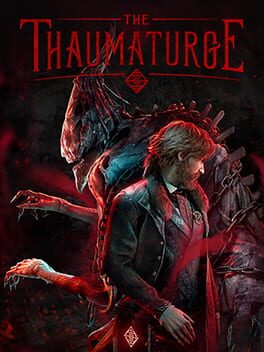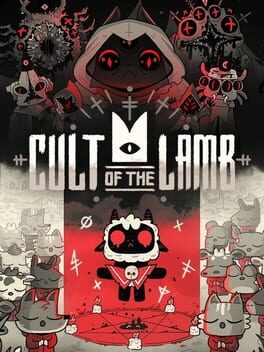ithil
2024
TL;DR - The setting alone makes the game worth it, but there are a few areas where it underdelivers. Because of this I consider it to be a flawed gem.
The depiction of an early 20th century alternative Warsaw under Russian control caught my attention when I first heard about the game. Historical elements and fiction blended nicely, and I loved the whole idea of thaumaturges, flaws and salutors.
This was clearly the big selling point of The Thaumaturge and it showed. I hope more devs follow the tracks of Fool's Theory and bring us more original, personal even, takes on fantasy.
Gameplay mechanics (exploration with a bit of detective work + turn-based combat) were fun in principle, and I was engaged with the plot and characters. All the ingredients seemed to be there for a new RPG favourite after Disco Elysium and Baldur's Gate 3.
Unfortunately, as the game went on I found that it failed to dive deep into most of these areas. Investigation mechanics became repetitive and posed no real deduction work. Likewise, the combat system features some really interesting elements, but I didn't need to (or felt compelled to) explore its possibilities and I ended up resorting to the same strategy most of the time. In normal difficulty I didn't really feel a challenge that made me adapt except for a couple of fights.
The character cast was varied and interesting, matching the game world, but once again, their treatment ended up being a bit shallow sometimes.
Dialogue sequences at times gave me the impression they weren't following a consistent order. Not sure if this could be due to localization issues (I played in Spanish or English and noticed this in both cases), scripting issues or oversights that didn't get caught by QA. Spanish localization was better than I expected, but I still noticed some mistranslations between text and voiced dialogue.
As for technical stuff, I played about half of the game on a high tier gaming laptop and the other half on a Steam Deck. I experienced no issues in the laptop but the fans were working overtime.
On the Deck it played reasonably well but there were occasional glitches in animations and a fair amount of crashes moving between locations. The game works on that platform without a lot of tinkering beyond manually selecting a Proton version, BUT the graphical settings are unnecessarily locked by default. Because of this it is currently flagged as Unsupported. Still, the graphical options can be easily unlocked using command line options.
And well, in both devices characters' facial expressions and animations in cutscenes or battle scenes sometimes fell into uncanny valley.
This review may have come up a bit harsh. It could be my frustration speaking because The Thaumaturge came really close to become a personal favourite but ultimately fell short. Despite that, I had a great time playing and I certainly recommend it.
I won't be replaying the game soon because of three B's (BG3, Balatro, Backlog) but I'm still curious about how differently you can shape Wiktor and what the other endings are. And I would definitely play a sequel or spinoff with the same setting.
The depiction of an early 20th century alternative Warsaw under Russian control caught my attention when I first heard about the game. Historical elements and fiction blended nicely, and I loved the whole idea of thaumaturges, flaws and salutors.
This was clearly the big selling point of The Thaumaturge and it showed. I hope more devs follow the tracks of Fool's Theory and bring us more original, personal even, takes on fantasy.
Gameplay mechanics (exploration with a bit of detective work + turn-based combat) were fun in principle, and I was engaged with the plot and characters. All the ingredients seemed to be there for a new RPG favourite after Disco Elysium and Baldur's Gate 3.
Unfortunately, as the game went on I found that it failed to dive deep into most of these areas. Investigation mechanics became repetitive and posed no real deduction work. Likewise, the combat system features some really interesting elements, but I didn't need to (or felt compelled to) explore its possibilities and I ended up resorting to the same strategy most of the time. In normal difficulty I didn't really feel a challenge that made me adapt except for a couple of fights.
The character cast was varied and interesting, matching the game world, but once again, their treatment ended up being a bit shallow sometimes.
Dialogue sequences at times gave me the impression they weren't following a consistent order. Not sure if this could be due to localization issues (I played in Spanish or English and noticed this in both cases), scripting issues or oversights that didn't get caught by QA. Spanish localization was better than I expected, but I still noticed some mistranslations between text and voiced dialogue.
As for technical stuff, I played about half of the game on a high tier gaming laptop and the other half on a Steam Deck. I experienced no issues in the laptop but the fans were working overtime.
On the Deck it played reasonably well but there were occasional glitches in animations and a fair amount of crashes moving between locations. The game works on that platform without a lot of tinkering beyond manually selecting a Proton version, BUT the graphical settings are unnecessarily locked by default. Because of this it is currently flagged as Unsupported. Still, the graphical options can be easily unlocked using command line options.
And well, in both devices characters' facial expressions and animations in cutscenes or battle scenes sometimes fell into uncanny valley.
This review may have come up a bit harsh. It could be my frustration speaking because The Thaumaturge came really close to become a personal favourite but ultimately fell short. Despite that, I had a great time playing and I certainly recommend it.
I won't be replaying the game soon because of three B's (BG3, Balatro, Backlog) but I'm still curious about how differently you can shape Wiktor and what the other endings are. And I would definitely play a sequel or spinoff with the same setting.
2024
The first time I read about Balatro I saw it defined as "poker roguelite" and I wasn't particularly interested by the pitch. Some reviewers I follow lauded it as the next indie sensation like Loop Hero, Inscryption or Vampire Survivors were in the past, and that made me curious enough to try the demo during the latest Steam Fest.
By the time I got to Ante 2 in the tutorial run I had understood the praise.
The concept is simple, but the depth and variability makes it endlessly replayable and addicting as crack. After 20-something hours my joker collection is currently at 2/3, but the joy of discovering how a specific combination of jokers and card bonuses works together to break your high score remains.
Visuals and sound work great, they've put a lot of work on the details to make it feel satisfying (I have muted the music though, it became repetitive after a while).
Session length and controller support makes it a perfect game for commuting. I've played both on laptops and on my Steam Deck and it works great on either, except for a couple of minor annoyances using the latter:
- First, I'd recommend to tweak the input so you won't accidentally change focus with the touchpads.
- Also, perhaps as a consequence of the former, selecting cards from large hands (for example, +3 or 4 over the default hand size) could be glitchy.
By the time I got to Ante 2 in the tutorial run I had understood the praise.
The concept is simple, but the depth and variability makes it endlessly replayable and addicting as crack. After 20-something hours my joker collection is currently at 2/3, but the joy of discovering how a specific combination of jokers and card bonuses works together to break your high score remains.
Visuals and sound work great, they've put a lot of work on the details to make it feel satisfying (I have muted the music though, it became repetitive after a while).
Session length and controller support makes it a perfect game for commuting. I've played both on laptops and on my Steam Deck and it works great on either, except for a couple of minor annoyances using the latter:
- First, I'd recommend to tweak the input so you won't accidentally change focus with the touchpads.
- Also, perhaps as a consequence of the former, selecting cards from large hands (for example, +3 or 4 over the default hand size) could be glitchy.
2018
Copy-pasted with lots of edits from a post I wrote in r/PatientGamers
When I first heard of Hades I thought "damn, this game sounds like it was made specifically for me". The choice of Greek mythology (IMO used in a knowledgeable way) for the theme with a touch of the spooky caught my interest immediately, and I really like action roguelites, leaning more towards stylized visuals.
I decided to wait for the full release on Steam (painful choice), but once I got to play it confirmed my expectations and even surpassed them.
The reasons why it's one of my 10/10 games come from how both the package as a whole and individual areas stand out, without any significant flaw.
Art is fricking gorgeous and the soundtrack and voice acting, just terrific.
The environments are really detailed and full of life (ironically). I found characters charismatic af, and the story was solid and compelling. A significant factor in my appreciation of the game comes from the way Supergiant managed to blend story within the roguelite gameplay loop. It could have been tricky to pull off, but they did it.
Last but not least, gameplay was so, so fun. Controlling Zagreus just feels great, and while there might be some builds that work better than others, or some weapons may fit some personal preferences better, experimenting and trying them all always remains entertaining (it's possibly the first game where I've enjoyed playing with a shield! 🤔) thanks to the VAST amount of flexibility. Procedural levels also give enough variation to mitigate the impact of repetition.
I found the difficulty challenging but never super frustrating (you can always tune it even further later on) and because of the progression systems dying never feels too punitive because you're always getting something new when you go back home, either in the shape of an upgrade, a new story fragment or who knows, perhaps something new awaits you now in your next attempts to escape. This gives you that slight push to try "just one more run" (and then three hours have vanished).
One of my all-time favourites, so I can't be too objective.
When I first heard of Hades I thought "damn, this game sounds like it was made specifically for me". The choice of Greek mythology (IMO used in a knowledgeable way) for the theme with a touch of the spooky caught my interest immediately, and I really like action roguelites, leaning more towards stylized visuals.
I decided to wait for the full release on Steam (painful choice), but once I got to play it confirmed my expectations and even surpassed them.
The reasons why it's one of my 10/10 games come from how both the package as a whole and individual areas stand out, without any significant flaw.
Art is fricking gorgeous and the soundtrack and voice acting, just terrific.
The environments are really detailed and full of life (ironically). I found characters charismatic af, and the story was solid and compelling. A significant factor in my appreciation of the game comes from the way Supergiant managed to blend story within the roguelite gameplay loop. It could have been tricky to pull off, but they did it.
Last but not least, gameplay was so, so fun. Controlling Zagreus just feels great, and while there might be some builds that work better than others, or some weapons may fit some personal preferences better, experimenting and trying them all always remains entertaining (it's possibly the first game where I've enjoyed playing with a shield! 🤔) thanks to the VAST amount of flexibility. Procedural levels also give enough variation to mitigate the impact of repetition.
I found the difficulty challenging but never super frustrating (you can always tune it even further later on) and because of the progression systems dying never feels too punitive because you're always getting something new when you go back home, either in the shape of an upgrade, a new story fragment or who knows, perhaps something new awaits you now in your next attempts to escape. This gives you that slight push to try "just one more run" (and then three hours have vanished).
One of my all-time favourites, so I can't be too objective.
2023
This review contains spoilers
This game was a great refresher to take my mind away from Baldur's Gate 3 for a while :D
The layers of puzzle-solving, especially the language-decoding ones, made this game a really interesting experience, with the right difficulty so you could feel challenged without ever feeling frustrated or too overwhelmed.
The language learning process was the key selling point and it really shone for me, both the specifics of figuring out a single language in isolation and also the conversion rules to translate from one to the other. The dialogue puzzles @ the machines felt especially satisfying for me, as you could see how you were finally connecting people together.
I really appreciate games trying to weave mechanics and the narrative together and IMO Changs of Senaar achieved it.
If I had to point anything I missed it would be having floor maps. As you progress you end up unlocking a teleport feature, and some areas do use signs or simplified diegetic maps, but when you had to backtrack remembering the layout could become a bit annoying.
Beyond the puzzles there were also stealthy bits, and the controls to pick up valid hiding spots felt a bit rough. While I don't dislike stealth mechanics (it depends on the game) I could have lived without them here, to be honest, but there weren't too many and were reasonably easy.
Visuals were gorgeous, and the overall atmosphere felt pretty relaxed for the most part.
PS: Fully played on a Steam Deck. No issues at all.
The layers of puzzle-solving, especially the language-decoding ones, made this game a really interesting experience, with the right difficulty so you could feel challenged without ever feeling frustrated or too overwhelmed.
The language learning process was the key selling point and it really shone for me, both the specifics of figuring out a single language in isolation and also the conversion rules to translate from one to the other. The dialogue puzzles @ the machines felt especially satisfying for me, as you could see how you were finally connecting people together.
I really appreciate games trying to weave mechanics and the narrative together and IMO Changs of Senaar achieved it.
If I had to point anything I missed it would be having floor maps. As you progress you end up unlocking a teleport feature, and some areas do use signs or simplified diegetic maps, but when you had to backtrack remembering the layout could become a bit annoying.
Beyond the puzzles there were also stealthy bits, and the controls to pick up valid hiding spots felt a bit rough. While I don't dislike stealth mechanics (it depends on the game) I could have lived without them here, to be honest, but there weren't too many and were reasonably easy.
Visuals were gorgeous, and the overall atmosphere felt pretty relaxed for the most part.
PS: Fully played on a Steam Deck. No issues at all.
2022
Good, but unfortunately it wasn't memorable for me beyond the cute, creepy aesthetics, which were fantastic.
The cult management aspect was relatively straightforward and became repetitive pretty soon. I never really got to care much about my followers, nor their traits felt particularly relevant. As for the dungeon crawling part, combat made me think of Hades meets The Binding of Isaac, but simpler and less fun than either of them.
About this, rooms could get too packed and noisy with environmental elements, making it unnecessarily tricky to spot enemies or projectiles. I spent most of my playthrough on a Steam Deck, and it was especially blatant in here.
Dev support has been decent with several patches and content updates on the way. There are still some issues and UX annoyances, though (my biggest gripe for me was the "hold"-style interactions triggering the respective combat action as well, especially when it'd trigger a curse and spend fervor)
The cult management aspect was relatively straightforward and became repetitive pretty soon. I never really got to care much about my followers, nor their traits felt particularly relevant. As for the dungeon crawling part, combat made me think of Hades meets The Binding of Isaac, but simpler and less fun than either of them.
About this, rooms could get too packed and noisy with environmental elements, making it unnecessarily tricky to spot enemies or projectiles. I spent most of my playthrough on a Steam Deck, and it was especially blatant in here.
Dev support has been decent with several patches and content updates on the way. There are still some issues and UX annoyances, though (my biggest gripe for me was the "hold"-style interactions triggering the respective combat action as well, especially when it'd trigger a curse and spend fervor)




